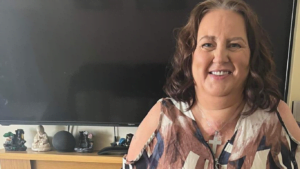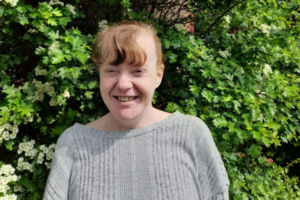Lucy's story
I came to be in the role of a peer support worker after a series of events which changed my perception of my life’s expectations and social norms. For years I had a professional career which was completely overwhelming. I had a partner who was abusive. Every day of my life was a relentless struggle to reach the end.
When I wasn’t working I could hardly leave the house without throwing up. My anxiety manifested physically and I would be in the doctors all the time, almost hoping I had some kind of illness which could explain everything away for me because to think that these symptoms were all in my mind was preposterous to me.
The Lucy who I had been before seemed to have disappeared completely, buried under expectations and fear and the constant thought that I was letting down myself and everyone around me all the time. I didn’t know about mental health or anxiety and how it can affect every aspect of a person’s life, so I felt alone in the world, completely singular, like no one else could understand me and I was going to be like this forever – the absence of hope.
One day I snapped and quit my career and my relationship. I had let everything go on for too long without seeking help and I was at rock bottom. This was the scariest thing I’ve ever done but it was my first step towards becoming myself again.
I went to NHS counselling, workplace specific counselling and I even studied for and completed an HND in counselling skills because I was absolutely determined to understand mental health issues and what was going on with me as normal- as opposed to something that only I experienced. After I quit my career I was terrified. I didn’t have any options and I couldn’t imagine starting a new job in my current state. I found the Glasgow Centre for Inclusive Living who run the Equality Academy – a traineeship for graduates with disabilities who want to get on a professional career path. I never thought of my mental health issues as a disability before, but the fact is, they were stopping me from living life or working again. I met so many people with similar struggles.
Through every avenue I turned with endeavour to recover, the most fruitful part of the whole experience was just talking to other people who feel the same as me and made me feel ‘normal’. Getting rid of the stigma of mental health issues I believe is an enormous factor toward recovery, the finding of hope again in our lives and the ability to change your perception of that which has been your downfall.
We can beat the stigma together and believe that life can be good again.
Recovery happened for me over a long number of years and my anxiety and depression is still something I have to work on but today I am a peer support worker who has managed to take the most negative experiences I have gone through and turn their outcomes into skills and knowledge which I can use to support others. Something about using my ‘worst’ qualities to have a successful career is completely cathartic to me – the perception of how I see my mental health has been turned on its head.
I hope that lived experience helps me in my role as I now have a very open mind and the utmost respect for anyone putting themselves forward to using our peer support service as I know that the first steps to getting help are the scariest and most confusing. Before I met other people with mental health issues I really thought that everyone else had something I was missing and that I was truly incapable of living a normal life. I am here as a peer who just wants to listen and help people though those awful times with self-evidence that recovery is possible.
I never believed anyone who told me that in time things could get better until I met people who had been through similar struggles. They did more for me than any medication, counselling session or healthcare professional.
I feel like I can inspire real hope for people who don’t think it exists. We can beat the stigma together and believe that life can be good again.
Lucy is a Recovery Practitioner Peer in our East Renfrewshire team. Thanks for sharing your story with us, Lucy.





